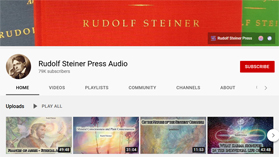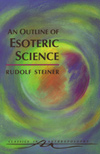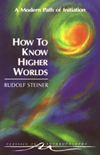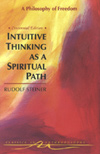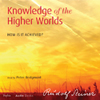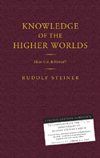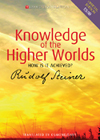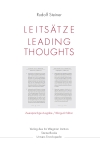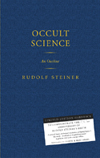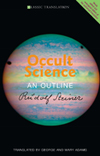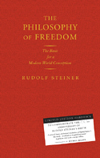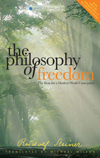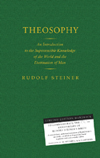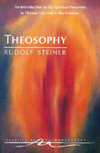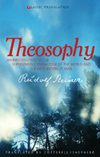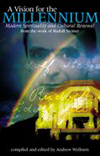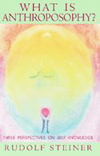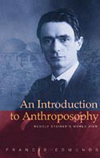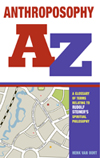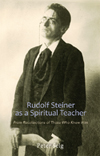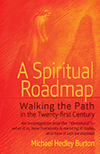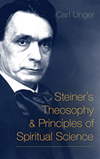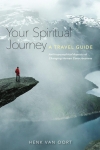
- RUDOLF STEINER
- OTHER AUTHORS
-
FUNDAMENTAL AND INTRODUCTORY WORKSRUDOLF STEINER
AN OUTLINE OF ESOTERIC SCIENCE
"Esoteric science is the science of what takes place esoterically, in the sense that it is perceived not outside in nature but where one's soul turns when it directs its inner being toward the spirit. Esoteric science is the opposite and counterpart of natural science." Rudolf Steiner
NEW EDITION
A true classic of spiritual literature. It is one of the best ways I know for opening up one's life to the spiritual realms in a manner that is balanced, integrated, and loving. It is the product of a great soul who stood on the threshold of a new spiritual terrain and pointed out new routes into the interior. This is a guidebook of the first order, an asset to any spiritual seeker in our time.
INTUITIVE THINKING AS A SPIRITUAL PATH
A Philosophy of Freedom
'Classics in Anthroposophy' series
This seminal work asserts that free spiritual activity - the human ability to think and act independently of physical nature - is the appropriate and available path for human beings today to gain true knowledge of themselves and of the universe.
KNOWLEDGE OF THE HIGHER WORLDS
How is it Achieved?
Audio Book (CD box set), complete and unabridged
Read by Peter Bridgmont
Rudolf Steiner's fundamental handbook for spiritual and personal development has grown more modern as time has passed, although his methods remain clearly distinguishable from the many others now in circulation. Steiner's path of spiritual growth is based on the clarity of thought normally associated with scientific research. Rather than denying clear thinking, his aim is to extend it beyond its present limitations. Steiner recognizes - as all genuine disciplines always have - that the path to spiritual experience is an arduous and dangerous one, calling for self-control in thought, word and deed. Human beings comprise a unity, and we cannot develop knowledge without a corresponding development in feeling and will.
KNOWLEDGE OF THE HIGHER WORLDS
How is it Achieved?
Given his energetic involvement in practical initiatives and extensive lecturing, Rudolf Steiner had little time to write books. Of those he did write - belonging almost entirely to the earlier years of his work - four titles form an indispensable introduction to his later teaching: Knowledge of the Higher Worlds, Occult Science, The Philosophy of Freedom and Theosophy.
KNOWLEDGE OF THE HIGHER WORLDS
How is it Achieved?
Rudolf Steiner's fundamental handbook for spiritual and personal development has grown more modern as time has passed, although his methods remain clearly distinguishable from the many others now in circulation. For one thing, Steiner's path of spiritual growth is based on the clarity of thought normally associated with scientific research. Rather than denying clear thinking, his aim is to extend it beyond its present limitations. Secondly, Steiner recognizes - as all genuine disciplines always have - that the path to spiritual experience is an arduous and dangerous one, calling for self-control in thought, word and deed. Human beings comprise a unity, and we cannot develop knowledge without a corresponding development in feeling and will.
Bilingual Edition (CW 26)
“Anthroposophy is a path of knowledge that would guide the spiritual in the human being to the spiritual in the universe.”
An Outline
Given his energetic involvement in practical initiatives and extensive lecturing, Rudolf Steiner had little time to write books. Of those he did write - belonging almost entirely to the earlier years of his work - four titles form an indispensable introduction to his later teaching: Knowledge of the Higher Worlds, Theosophy, The Philosophy of Freedom and Occult Science.
An Outline
An authorised translation of this classic work, re-edited, beautifully typeset and designed, from a professional publisher dedicated to high-quality editions of Rudolf Steiner’s books and lectures.
The Basis for a Modern World Conception
Given his energetic involvement in practical initiatives and extensive lecturing, Rudolf Steiner had little time to write books. Of those he did write - belonging almost entirely to the earlier years of his work - four titles form an indispensable introduction to his later teaching: Knowledge of the Higher Worlds, Occult Science, The Philosophy of Freedom and Theosophy.
The Basis for a Modern World Conception
Are we free, whether we know it or not? Or is our sense of freedom merely an illusion? Rudolf Steiner tackles this age-old problem in a new way. He shows that by taking account of our own activity of thinking, we can know the reasons for our actions. And if these reasons are taken from our world of ideals, then our actions are free, because we alone determine them.
An Introduction to the Supersensible Knowledge of the World and the Destination of Man
Given his energetic involvement in practical initiatives and extensive lecturing, Rudolf Steiner had little time to write books. Of those he did write - belonging almost entirely to the earlier years of his work - four titles form an indispensable introduction to his later teaching: Knowledge of the Higher Worlds, Occult Science, The Philosophy of Freedom and Theosophy.
An Introduction to the Spiritual Processes in Human Life and in the Cosmos
Steiner turns his philosophically trained scientific mind to the precise phenomenological description of his own supersensible experiences and the supersensible phenomena revealed by them.
An introduction to the supersensible knowledge of the world and the destination of man
CLASSIC TRANSLATION
Given his energetic involvement in practical initiatives and extensive lecturing, Rudolf Steiner had little time to write books. Of those he did write - belonging almost entirely to the earlier years of his work - four titles form an indispensable introduction to his later teaching: Knowledge of the Higher Worlds, Occult Science, The Philosophy of Freedom and Theosophy.
Modern Spirituality and Cultural Renewal
Compiled and edited by Andrew Welburn from the work of Rudolf Steiner
Could it not be possible that today something of infinite importance is taking place without people being aware of it... Something of supreme importance is taking place, although it is perceptible only to the eye of the spirit.
Three Perspectives on Self-Knowledge
Radical, thought-provoking, and indeed mind-boggling, What Is Anthroposophy? leads to a completely itself is not just physical, but psychic and spiritual as well.
-
FUNDAMENTAL AND INTRODUCTORY WORKSOTHER AUTHORS
AN INTRODUCTION TO ANTHROPOSOPHY
Rudolf Steiner's World View
Francis Edmunds
Although many of the practical activities that arise from Rudolf Steiner's work are well publicized, the philosophy that stands behind them remains largely hidden. Thousands of parents send their children to Rudolf Steiner (Waldorf) schools around the world, while biodynamic farming (the Demeter label) and anthroposophical medicine are gaining increasing recognition. Yet despite all this and much other visible work, few are aware of the richness of Rudolf Steiner's world view, anthroposophy.
A glossary of terms relating to Rudolf Steiner's spiritual philosophy
Henk van Oort
Rudolf Steiner's spiritual philosophy is the inspiration for many successful initiatives in the world today, from the international Steiner Waldorf school movement to biodynamic agriculture and its increasingly popular produce. Steiner developed his philosophy in dozens of books and many thousands of lectures. His teaching contains dozens of new concepts and ideas, and as a result he had often to create his own vocabulary. In this practical volume - a companion to his Anthroposophy, A Concise Introduction - Henk van Oort gives concise definitions of many terms and concepts in Steiner's worldview, from the most commonplace to the more obscure.
RUDOLF STEINER AS A SPIRITUAL TEACHER
From Recollections of Those Who Knew Him
Peter Selg
"He listened extremely attentively, apparently not looking at me at all, but totally devoted to my words." - Franz Kafka
Walking the Path in the Twenty-first Century
Michael Hedley Burton
An investigation into the “threshold”—what it is, how humanity is meeting it today, and how it can be crossed
STEINER'S THEOSOPHY & PRINCIPLES OF SPIRITUAL SCIENCE
Carl Unger
"[In February 1904] Dr. Steiner began his lecture tours. Meanwhile, his book Theosophy was published, and I threw myself into it with the greatest enthusiasm, wrestling with it for months with every page, every sentence, and many words. When I had the foundation for a judgment, which I had somewhat carelessly expressed after my visit to Berlin, I would follow this man blindfolded. For now I had learned to follow with open eyes." —Carl Unger
A Travel Guide
Anthroposophical Aspects of Changing Human Consciousness
Henk Van Oort
In a series of short studies enlivened with colour illustrations, Henk van Oort takes the reader on a spiritual journey through a variety of topics relating to everyday experience. With chapters as diverse as ‘The Human Will’, ‘Quantum Physics’ and ‘Good and Evil’, the book’s common theme is the dynamic nature of human consciousness.

